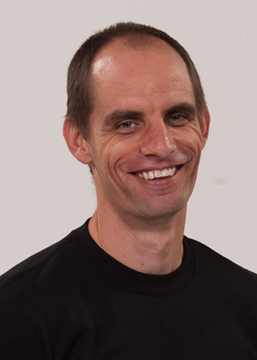May 10, 2011
As 2011-2012 Coffman Chair, Wesch plans to help faculty understand and incorporate new media in teaching

Many of the careers that Kansas State University students are now preparing for are in a state of transformation because of new media like blogs, wikis and more, according to Michael Wesch, K-State associate professor of cultural anthropology and an internationally recognized expert on the effects of new media on culture and society.
But are faculty members keeping up with the changes new media are bringing?
That's why Wesch will make improving new media literacy across campus his project as K-State's 2011-2012 Coffman Chair for Distinguished Teaching Scholars. The chair highlights the university's commitment to excellence in undergraduate teaching and learning.
"With his appointment as our next Coffman Chair, Michael Wesch brings to the forefront the importance of effective use of new media in learning at Kansas State University," said April Mason, K-State provost and senior vice president. "Understanding how to effectively use the latest teaching tools is not only essential to providing our students with the best education possible, but it also shows the expertise required for K-State to become a top 50 public research university by 2025."
New media can create new types of conversation, exchange and collaboration in teaching and learning, but understanding how they work is key to using them effectively, Wesch said.
"While new media bring new possibilities for openness, transparency, engagement and participation, they also bring new possibilities for surveillance, manipulation, distraction and control," he said. "The negative side of this ledger seems especially eminent in the face of widespread ignorance about the uses, misuses, power and consequences -- sometimes unintended -- of new media.
"If we do not quickly raise our new media literacy rates we stand to lose much more than we gain from the promises of new media. Regardless of whether we imagine our primary goal as educators to be the creation of tomorrow's work force or for creating well-informed and engaged citizens, new media literacy is essential," he said.
Wesch will use two complementary approaches to improve new media literacy at K-State. He first wants to make it easier for faculty and students to incorporate new media and the associated skills needed into their learning.
"I hope to achieve this by helping the K-State Online team integrate wikis and blogs and design and build other new media tools and tutorials right into K-State Online, so they can be easily integrated into courses across the university," he said. "These tutorials will include real examples from other courses around the world to demonstrate how such tools can be used as part of an effective learning environment."
Second, Wesch said, is the creation of a campus culture that recognizes the importance of preparing students to navigate, harness and leverage new media effectively, and one that provides a supportive environment for faculty to rethink and retool their courses so students learn and practice new media literacy under the guidance of knowledgeable faculty. To this end, the core of his goal for this coming year is the creation of a New Media Literacy Faculty Fellows Program.
For the pilot program, six faculty members who have demonstrated excellence in teaching and who are already or would like to begin incorporating new media literacy in their courses will be selected from a broad range of disciplines.
"Much like the Peer Review of Teaching Program, for which I served as coordinator from 2007-2009, we will meet frequently and visit each others' classrooms periodically as we reflect on the effectiveness of our teaching," Wesch said.
"All fellows in the program will be encouraged to share their progress, successes and failures through an open blog and other new media methods -- tweets, videos, wikis, etc. -- in such a way as to invite other teaching scholars across the campus and around the world to help us achieve our goal of improving new media literacy in our respective disciplines," he said.
Wesch uses new media in his teaching with award-winning results. He was named the 2008 CASE/Carnegie U.S. Professor of the Year for Doctoral and Research Universities; received a Rave Award from Wired magazine, which dubbed him "the explainer" for his expertise in new media; earned the John Culkin Award for Outstanding Praxis in Media Ecology; and was named an Emerging Explorer by National Geographic.
At K-State, Wesch created and leads the Digital Ethnography Working Group, a team of undergraduates exploring human uses of digital technology. He and 200 of his students created the widely acclaimed and viewed video "A Vision of Students Today," which explores the state of higher education today. Wesch is currently working on a new video, "Visions of Students Today." The collaborative project involves submissions of videos from students across the world about their educational experiences today.
Wesch is the 17th faculty member appointed to the Coffman Chair for Distinguished Teaching Scholars since it was created in 1995. He will retain the title of distinguished teaching scholar after his term ends.
